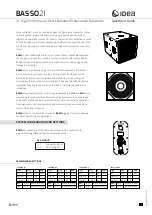
typical front corner placement in most rooms,
you may very well find the "0" setting to be opti-
mum.
Section 5—Advanced Calibration and
Correction
One of the most impressive features of your
UFW-10 Subwoofer is the built-in parametric EQ
shown as “K” in figure 1.1 and detailed below in
figure 5.1. Depending on the nature of your
room or listening environment, your subwoofer
may be reinforcing certain frequencies in the
UFW-10’s operating range such that they are sig-
nificantly louder (at your listening position) than
the desired response. Using the three dials
shown in figure 5.1 below, the UFW-10’s para-
metric equalizer will allow you to flatten up to 1
peak in your room, thus giving you the flattest
(most natural) overall response.
In order to find out exactly how your room is af-
fecting your UFW-10 Subwoofer, you need to
perform a “frequency sweep” of your room. This
will give you a graphical representation of how
the UFW-10 is performing in your unique listen-
ing environment.
5.1 Performing a Room Frequency Sweep
Though there are a number of ways to perform
an accurate frequency sweep, we’ve detailed the
steps involved in the most basic method below.
a. Sit in your favorite seat and hold your Ra-
dio Shack SPL meter at a 45-degree angle
half way between horizontal and vertical.
b. The meter should be placed at ear level
when seated in the primary listening posi-
tion, and is best if supported by a station-
ary object such as an end table or tripod.
c. Assuming you have already calibrated all
channels to reference level, set your sub’s
volume to 70dB.
d. Play a 20Hz track from a test tone CD,
such as one available through
www.rivesaudio.com,
and record BOTH
the frequency (your x-axis), which corre-
sponds to the track on the test disc, and
the SP level (your y-axis) as shown on
the meter.
e. Next, play the tracks from 25Hz to 120Hz
and record the SP Level for each fre-
quency played.
Important Note: The RadioShack sound meter
uses C-weighting. As a result, a correction key
is needed to ensure proper response before your
final measurements are plotted. We suggest
gathering your data using the readings on the
meter and then correcting your results with the
compensation coefficients shown in figure 6.1 (at
the end of this manual). The Rives disc men-
tioned above includes compensated test tones.
5.2 Interpreting the Results
Once you’ve completed this exercise, you will
have a data list much like that shown in figure
5.2 below (though much more detailed and com-
plete).
Now that you have a complete data set derived
from YOUR room, you need to plot this response
visually, either in MS Excel or simply on graph
paper (a computer application is recommended
to smooth the curve) to obtain a graphical repre-
sentation of your room’s effect on the UFW-10.
An example, derived from figure 5.2 above, is
shown on the following page in figure 5.3.
Frequency
(Hz)
Gain (dB)
20
64
25
67
32
70
40
71
55
74
63
71
80
72
100
70
Figure 5.1
Figure 5.2






























